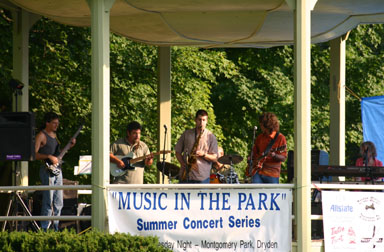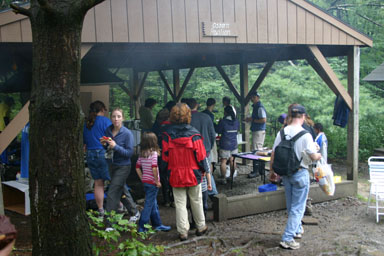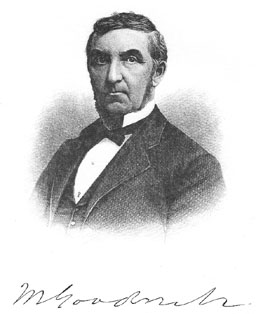August 1, 2004
Early transportation and crime
I'm not sure what George Goodrich would think of Dryden's current road network, but I'm sure he'd appreciate its general lack of mud, especially on the Bridle Road, now Routes 13 and 366 (and maybe 392 as well, though I need to find an old map to check that.) In this chapter from the Centennial History of Dryden, Goodrich examines the difficulties of getting around in Dryden's early history, as well as a notorious crime in Lansing with Dryden connections. (Ruloff's bar on College Avenue in Ithaca is named after the villain.)
Chapter XIII.
The Period of Development - Transportation
We now enter upon the second quarter-century of Dryden's inhabitation, extending from 1823 to 1847 inclusive, which, for the want of a more appropriate name, we shall refer to as the "Period of Development." The term development might properly be applied to the entire period of Dryden's history, but we feel justified in applying it especially here from the fact that during this particular time the town supported, and was developed with the aid of, its largest number of inhabitants, and the change of its territory from a "howling wilderness" to a productive, civilized country township was more rapid at this time than any other. We shall not attempt to review the events of this period so much in their chronological order as was done in treating the "Pioneer Period," but we shall view the development of our subject from several different standpoints, first giving attention to the matter of transportation.
As we have already seen, the earliest pioneer settlers came bringing their scanty supplies on ox-sleds with wooden shoes, the primitive "Bridle Road" presumably not being adapted to transportation by wheeled vehicles, even in the summer time. At the end of the first twenty-five years the principal thoroughfares had become passable by wagons and stages, the stumps having been removed, the low places being filled with corduroy crossing and the principal streams being spanned with pole bridges. Our highways are none too good at the present time, but we can realize that very much has been done, and much time and labor has been required, to bring them to even their present state of development. Those of us who have occasion to use "woods roads" of the present day are not surprised to read the accounts of the frequency with which the teamsters became "mired" in using the only means of transportation which was then afforded. In view of these circumstances we are not surprised to learn that the first mail was carried by a man on foot between Oxford and Ithaca from 1811 to 1817, and that the first stage commenced running between Homer and Ithaca through Dryden in 1824. Other localities seem to have been more early favored than ours in this respect and the Bath and Jericho Turnpike, chartered by the State in 1804, and later forming a part of the old Ithaca and Catskill stage route and still known as the "turnpike" from Slaterville to Ithaca, passing through the southwest corner of our town, was one of the early thoroughfares connecting the East with the West. But during the period of which we are now speaking transportation on the principal highways, in the absence of all other means, was very much employed, and upon the Bridle Road between Dryden and Ithaca nearly, if not quite, a dozen local hotels or "Taverns," as they were then called, ministered to the wants of travelers and teamsters, and in so doing conducted a thriving business. One of them was the Dryden Center House originally built and operated early in this period by Benjamin Aldrich, already mentioned among the early town officers.
Unlike most of these country inns the Center House has not been permitted to run down, but under the management of its present proprietor, Gardner W. S. Gibson, has been repaired and improved so that it now presents a modern appearance, fully in keeping with its prominence in the early part of the town. Here for a long time town meetings were held and the official business of the town transacted and it is still patronized as the proper place for holding town caucuses. It was not uncommon in those days for such farmers as Edward Griswold and Elias W. Cady to take a wagon load of produce to market at Albany, returning with a load of store goods, and at certain seasons of the year the roads to Syracuse were lined with teamsters returning with wagon loads of salt, lime, and plaster, after having taken loads of farm produce to market. Towanda, then the head of navigation on the Susquehanna river, was also a favorite shipping point at which Dryden farmers marketed their produce.
The Erie Canal ("Clinton's Ditch" as it was derisively called in those times) was opened to navigation in 1825, and in the absence of railroads it soon became a great aid in the means of transportation. Some of the later settlers of this period, James Tripp, for example, who came in from Columbia county in 1836, shipped their goods by way of the canal and drove across the country with their horses and wagons. The Ithaca & Owego Railroad, the second to be chartered in the State, passed over a small corner of Dryden and was opened in 1834, but it was operated wholly by horse power in those days, and gave but little indication of the efficiency, as a means of transportation, afforded by railroads at the present time. Still until the financial panic of 1836, which was a temporary set back, this was a time of rapid growth and prosperity. Permanent buildings were constructed and manufacturing enterprises were instituted. The only brick dwelling ever constructed in Dryden village was built by John Southworth in 1836. The Mallory brothers, from Homer, in 1826 at a point since called from then Malloryville, and there operated a saw-mill, chair factory, carding and cloth dressing machinery and a dye house, employing from thirty to forty hands, and prospering until their mills were destroyed by fire in 1836, when they removed farther west. One of these Mallory brothers (Samuel) recently died at Elkhorn, Wisconsin, in his ninety-ninth year.
One of the distressing occurrences of this time, but one which we do not feel at liberty to omit from our History, which professes to speak of all the prominent events, resulted from the connection of the murderer, Edward H. Ruloff, with the town of Dryden. In the year 1842 he served as school teacher in Dryden village and numbers of his pupils are still residents here. He came originally from the province of New Brunswick. On December 31, 1843, he married Miss Harriet Schutt, a lovely Dryden girl seventeen years of age, who had been one of his pupils. They moved to the town of Lansing. In 1845 a daughter was born to them, but shortly afterwards the wife and daughter disappeared, the only visible means of their disappearance being a large strong wooden box which Ruloff was seen to drive away in a wagon towards Cayuga Lake.
He was soon after arrested in the West and brought back to this county; the bottom of the lake was dredged for the box in vain, and, there being no direct evidence of murder, Ruloff was finally sentenced to ten years in State's Prison for abducting his wife. Having served his term he was released and disappeared from public view until the year 1871, when he was convicted of participating in a robbery and murder at Binghamton, for which he was executed. He was a singular character, being a profound and diligent student, and his career was an interesting, though terrible one, afterwards being made the subject of magazine articles upon moral insanity, of which it seemed to furnish a striking example.
Goodrich, George B. The Centennial History of the Town of Dryden, 1797-1897. Dryden: Dryden Herald Steam Printing House, 1898. Reprinted 1993 by the Dryden Historical Society. Pages 40-43.
(The Dryden Historical Society, which sells this book, may be reached at 607-844-9209.)
August 2, 2004
August town meetings
The Town of Dryden has updated the public notices page for August.
- The Zoning Board of Appeals meets tomorrow, Tuesday, August 3rd, at 7:30 pm.
- The Recreation Commission is meeting on Monday, August 9th at 6:00 pm, at the Recreation Department Office (map). Use the back entrance.
- The Conservation Board is meeting Tuesday, August 10th, at 7:30 pm. (They're still looking for one new member.)
- The Town Board is meeting at 7:00pm on Thursday, August 12th. The full agenda for the first meeting is not yet posted.
- The Youth Commission will meet next on September 21st.
- The Planning Board is meeting at 7:00 pm on Thursday, August 19th.
Unless otherwise noted, all meetings listed here are at the Dryden Town Hall (map).
August 3, 2004
School lunch price hike
This morning's Ithaca Journal talks about impending increases in school lunch prices as well as additional costs (driven by the increasing cost of steel) for a heating and ventilation system. The Dryden Central School Board will vote on what to do at their August 31st meeting.
There's also mention of the Dryden Central School District in an article on "mobile lifestyles," where a family from Dryden is wandering the country in their RV. They homeschool the children, monitored by the Dryden Central School District.
In the opinion section, Lisa Cochran of Freeville writes to say that "A child can learn respect, compassion, responsibility, and how to love unconditionally from a home in which the parents -- either same-sex or not -- are in a stable and loving relationship," in response to a July 19th letter from Gabriel and Penelope Carpenter of Dryden.
August 4, 2004
Organic farm research in Freeville
This morning's Ithaca Journal visits the open house at Cornell's Freeville Organic Research Farm, looking at the experiments underway and visitor reactions.
Also in Freeville, Congressman Sherwood Boehlert will be hosting a forum on homeland security and first responders at the Freeville Fire Department (map) from 7 to 8pm tonight.
In Dryden Town Talk, Cathy Wakeman discusses last week's 4-H Fair, Sertoma Soccer, and concerts coming up.
The Dryden Briefs mention both the Conservation Board's continuing search for a new member and a tire collection day to be held Sunday, October 16th.
On the opinion page, Murray Cohen continues the apparent trend of Dryden residents writing on gay marriage, asking "To those opposed to gay marriage, if you're sincere in your belief in the sanctity of marriage, how can what other people do attenuate that belief?"
Update: Oops. Forgot to mention this piece on July's constant rains (more than double the average) and their impact on farmers.
Another update: I also left out this editorial on TC3's unhappy interactions with the New York State budget debacle.
Political categories
The "politics" category had accumulated enough stories that it was getting hard to see from the archives quite what was going on here. I've now split it into three categories. There's now a politics (local) category that focuses on town, village, and county politics. There's a politics (state) category that focuses on New York State politics. Finally, there's a politics (national) category for political issues involving the federal government.
I didn't originally think there'd be a need for a national politics category, as I generally write at the local and maybe state levels here, but it's important to cover Dryden residents' opinions and activities on the national level, and it also provides a good place to cover congressional races that include Dryden.
(If you're wondering what I'm talking about, scroll down the page and you'll eventually see a list of categories along the left-hand side.)
August 5, 2004
Congressman Boehlert in Freeville
Congressman Sherwood Boehlert held a forum at Freeville's W. B. Strong Fire Company yesterday, addressing a program, the Assistance to Firefighters Grant Program, which is set to expire at the end of this year. Boehlert is working on its renewal, and firefighters also sounded interested in some changes to encourage more training on the equipment it provides.
Elsewhere in the Journal, they report that Michelle Malmberg, who pleaded guilty to destroying evidence in the 2002 murder of Eric Tallman in Dryden, was denied release from a Texas jail where she is serving a sentence for drug possession.
On the opinion page, John Curatolo of Dryden writes that he "was absolutely appalled by the July 31 Ithaca Journal article regarding salvia divinorum." Like most writers to the Journal on the subject, he's concerned both about the substance and that the Journal effectively "made it an advertisement of where to buy a substance to get high with." (The Journal's editorial today calls for banning salvia.)
August 6, 2004
The Ellis family
The Ithaca Journal was quiet on Dryden this morning, and as I'm stuck an extra day at a conference in Montreal, I can't take more pictures of Dryden. Fortunately, I brought George Goodrich's Centennial History of Dryden with me, so here's another fine bit of Dryden history.
(I'm afraid it actually seems more opaque than Goodrich's usual style, but there are some good bits in here, especially about the "King of Dryden".)
Chapter XLIII.
The Ellis Family in Dryden
From the prominence of the Ellis pioneers in the early history of Dryden, and the fact that many of the present inhabitants trace their ancestry back to that family, a special chapter is here devoted to their history.
From an old family record, we find that Gideon Ellis and Elizabeth (Manchester), his third wife, lived, before and during the War of the Revolution, at West Greenwich, Rhode Island, where they became the parents of seven children, of whom three were destined afterwards to become the ancestors of many Dryden people. One of these was Oliver, born July 2, 1769; another, John, born May 22, 1771; and the youngest, Peleg, born May 9, 1775. An older half-brother, Gideon, Jr., was a pioneer of Cayuga county, and some of his descendants are now living at Aurora and Ithaca. The three brothers mentioned emigrated to Fairfield, Herkimer county, N. Y., before the year 1800, where Oliver met an accidental death, never having come to Dryden, but his widow, Hannah (Reynolds,) afterwards settled with some of her children near Malloryville in Dryden and two of her daughters became successively the wives of Andrew K. Fortner, the son of an early pioneer of Dryden, and another, Susan, the wife of Charles Grinnell, both soldiers and afterwards pensioners of the War of 1812; and another, Lovina, was the old lady, Mrs. Grant, who recently died in Dryden village. There are many descendants of Oliver living in other places and some descendants of the children named still reside in Dryden.
John Ellis before leaving Rhode Island had married Rhoda Rathburn. There had recently died at Royal Grant, Herkimer county, Dr. Samuel Cook, a Revolutionary surgeon of the 5th N. Y. regiment, to whom had been assigned four lots of the Military Tract, a surgeon's bounty. In March, 1768 [1798?], John purchased of the Cook estate Lot 23 of Virgil, upon which he settled in the same year. After remaining the about three years he sold that lot to Moses and Isaac Olmstead and came to Dryden, first settling near Malloryville in 1801, whence he removed to Ellis Hollow a few years later. His first wife having died, he afterwards married the widow of Jacob Hiles, the ancestor of the Hiles family in Dryden, and took up residence on the farm now owned by Wesley Hiles, where he died in 1844. His prominence in the political history of the town is unrivalled, he having held the position of school superintendent, commissioner of highways, and other offices, in addition to having been supervisor for twenty-seven years, fourteen of which were consecutive, member of assembly twice, and judge of the Court of Common Pleas of both Cayuga and Tompkins counties. In our times a politician who holds the office of supervisor of his town for a few years subjects himself to sufficient criticism and envy to blast his future political ambition, if he has any; but it was not so with Judge Ellis, whose record as an office-holder of the town of Dryden will doubtless always remain unequalled. He was a large land-owner and acted as the agent of a few non-resident holders of Dryden real estate, notably the McKay and Howland estates. At one time he was connected in land speculations with Daniel J. Shaw, who was then a Dryden village merchant.
Of his children, Charlotte married Charles Hart; Betsey, James McElheny; Amelia, Mahar Wigton; Nancy, John Southworth; and Lydia, her cousin, Warren D. Ellis, of Varna. His sons were James, Ira, Willet, John, and Peleg second. To those who are familiar with the present inhabitants of Dryden, these names will suggest many of the descendants of Judge Ellis, "King of Dryden."
Peleg Ellis, the pioneer of Ellis Hollow, as we have seen, exchanged his real estate in Herkimer county with the same Cook estate for Lot 84 of Dryden, to which he came, as has already been described in a former chapter, in 1799. Here, on the headwaters of Cascadilla Creek, he built his log house, to which the next year, on July 12, 1800, he brought his wife Ruth (Dawley) and two daughters, Mary, aged about four, who afterwards married Silas Hutchinson and died about five years ago aged 96 years, and a second daughter about two years of age who died in childhood. Ten children were born to them at the Ellis Hollow home, viz: Delilah, born Jan. 30, 1801, who married David Mulks, of Slaterville; Olive, who married James Mulks, of Ithaca; Lydia, who married Benjamin Ames; Mahala, who married Peter Worden, of Dryden; Warren D.; Ruth, who married John H. Kimball, of Berkshire; Huldah, who married her cousin, John C. Ellis, of Rhode Island; Sally, who married Marenus Ellis, late of Freeville; John J. Ellis, and Ann H., the widow of John M. Smith, late of Ellis Hollow. Of these, four daughters are still living, viz: Ruth, Huldah, Sally, and Ann H.
Peleg died May 9, 1859, aged 84 years upon that day. His wife survived him until 1870, when she died in her ninety-third year.
Major Ellis was not, like his brother John, a poltician, but in early life turned his attention to military affairs. When the War of 1812 broke out, being captain of the early state militia in Dryden, he volunteered with his whole company, instead of waiting as others did to be drafted; and instead of refusing to cross the Niagara River when the battle of Queenston was about to be fought, as did so many of the New York militia at that time, he followed across the frontier under the leadership of Winfield Scott, with his whole company, under Col. Bloom, of Lansing, and at the conclusion of the battle, together with about forty of the Dryden men, was among the prisoners of war; but they were immediately paroled and sent home. Like some others, Major Ellis acquired in his army experience the habit of the intemperate use of intoxicating drink and in after years when he indulged too freely his martial spirit manifested itself, and he would go through the manual of arms, in imagination commanding his company as of yore, with all the preciseness and dignity of actual military service. As his years grew upon him, however, he came to realize that his intemperate habits, first acquired in the army, were a detriment to him, and with a resolution stronger than many men of our times can muster, he suddenly broke himself of the growing habit and his last few years were characterized by his strict sobriety and a religious life.
John and Peleg Ellis were men deservedly popular and influential with their associates, both being selected as leaders of their fellow citizens, one in political and the other in military affairs. Both performed their duties faithfully and well, and both were so constituted as to become ornaments of the generation in which they lived and worthy of the honor and gratitude of their posterity and of the subsequent generations of the township which they served as leaders in their respective capacities.
For a portrait of Judge Ellis see the frontispiece of this volume.
Goodrich, George B. The Centennial History of the Town of Dryden, 1797-1897. Dryden: Dryden Herald Steam Printing House, 1898. Reprinted 1993 by the Dryden Historical Society. Pages 191-4.
(The Dryden Historical Society, which sells this book, may be reached at 607-844-9209.)
August 7, 2004
School funding uncertainty
Thanks to New York's protracted budget delay, local schools are still wondering what aid they'll be getting as they prepare to set their tax rates. Dryden School Board President Rachel Dickinson and Business Administrator Teresa Carnrike are both quoted in the piece about the situation's potential effect on the Dryden district. Assemblywoman Barbara Lifton and State Senator James Seward both seem to expect a budget this week.
In news affecting the county, New York State has rejected Schuyler County's plan for selling some Empire Zone acres to Tompkins County, though it sounds like they can revise the plan and push forward again. Also, natural gas delivery prices may be increasing 5% over the next four years.
On the opinion page, Teri Niziol of Dryden reports her shock over the Journal's recent salvia reporting, saying that "Our community needs to have information spread in print that promotes healthy living, family and community building and good moral choices."
On the same controversy, the Journal's managing editor, Dryden resident Bruce Estes, writes that "Alerting the community to potential health and safety risks is a fundamental job at The Ithaca Journal."
Teri Curatolo of Dryden writes to congratulate Ithaca Mayor Carolyn Peterson for choosing Lauren Signer to be the next police chief in Ithaca.
August 8, 2004
4-H Fair photos
While I was traveling, my lovely wife Tracey visited last week's 4-H Fair, camera in hand. Here are a few of her highlights.
August 9, 2004
Village of Dryden comprehensive plan, moratorium
This morning's Ithaca Journal examines the Village of Dryden's possible extension of its moratorium on multi-unit housing development. New York State has awarded the village a grant for executing a comprehensive plan, and the planning process is underway. I'll be curious to see the implications of this quote from the article:
The document reportedly backs up the idea that rentals are not a pressing need in the village, while smaller, affordable single family homes are needed.
There will be a public hearing on extending the 11-month-old moratorium on August 19th at 7pm at the Dryden Village Hall (map) as well as a presentation on the comprehensive plan by Thoma Development on August 31st.
Fingerlakes1.com
I just noticed another news source for the area, though it seems mostly to redirect to a variety of news sources: www.fingerlakes1.com.
It seems to be the home site for a network of radio stations, but also includes things like discussion forums. Their news section covers the Finger Lakes area pretty broadly, and the second article listed this morning (from the Syracuse Post-Standard) starts by looking back at the 1980 decision by former Congressman Gary Lee (R-Dryden) to oppose a settlement of the Cayuga Land Claim. Dryden seems to be on the edge of their coverage area, but it's interesting stuff in any event.
August Town Board agenda published
The agenda for the August 12th Town Board meeting has been posted. It looks like another full evening, though there are no public hearings. The meeting will start at 7pm, at the Dryden Town Hall (map).
Also, minutes for the July 8th meeting are now available.
August 10, 2004
Smoking, ATVs, Recreation Partnership
This morning's Ithaca Journal doesn't have a lot of news specifically about Dryden, but there's a fair amount that applies to Dryden.
County Legislator Mike Lane is quoted asking "How do you weigh the employee health risks vs. the economic loss of any applicants?" in an article on the Ithaca Bowl-O-Drome's request for a smoking waiver.
There are also two articles on calls for restrictions on ATV use, one covering it from the state perspective and another looking at it more locally, though the comments come from places south of Dryden.
On the opinion page, Helen May of Dryden writes regarding the new Ithaca police chief that "I would not blame the officers if there was a mass exodus."
Ithaca Town Supervisor Catherine Valentino writes a guest column on the future of the Recreation Partnership, an issue that is coming up in Dryden. (There will be a presentation on the Recreation Partnership at this Thursday's Town Board meeting.)
Also, I missed mentioning yesterday's editorial on the need for improvement to the intersection of Brown Road and Route 13. While just outside of the Town of Dryden, it's an intersection many Dryden residents encounter on their way to Lansing or Ithaca.
Catching up with the Courier
A new issue of the Dryden Courier will be out tomorrow, and I'm still catching up on last week's. (Unfortunately I missed the week before, but I'll track one down.)
The lead stories are on the Dryden Central School District's decision to subsidize summer school only for 11th and 12th graders, not for those in lower grades, and the Village of Dryden's annexation of 21.6 acres north of Route 38 that the Town Board approved back in March (with a SEQR declaration in April).
There are also two pictures from the 4-H Youth Fair and an article on the election of Zachary Slocum as TC3 student trustee.
August 11, 2004
School numbers arrive, jail numbers don't
This morning's Ithaca Journal reports that the New York State Legislature has finally passed an education bill, so schools will know their aid levels before they send out tax bills. Dryden will be getting $12.85 million this coming year as opposed to $12.22 million last year, and Ithaca will be getting $19.71 million as opposed to $18.48 million last year. State aid is 52% of Dryden's budget, and 23% of Ithaca's. Unfortunately this article doesn't seem to have made it into the online version of the Journal.
The county budget situation is complicated by the prospective costs for a new jail, which the county administrator has left out of next year's budget forecast, saying that the county can't afford the project now.
Back in Dryden, there's a piece on the Dryden Summer Skies program taking kids out to Cayuga Lake on the "Floating Classroom". The program teaches both information about the lake and skills for collecting new information about the lake.
The Our Towns section today is mostly about Groton, though the Dryden Briefs include the continuing search for a new Conservation Board member and the upcoming 200th anniversary of the Etna Community Baptist Church on September 19th.
On the opinion page, Stanley Marcus of Freeville says that he is "somewhat disappointed in the lack of interest the media have shown in learning more about Sandy Berger's theft of top-secret documents from the national archives."
Finally, there's a piece on the front page of the Journal (but not apparently online) about Congressman Sherwood Boehlert becoming acting chairman of the House Intelligence Committee. Boehlert, who chairs the Science Committee and sounds like he'd rather stay there long-term, will be taking over the Intelligence Committee after President Bush named the current chair, Porter Goss, to head the CIA.
Along the hill, across from Cornell fields
It's been over a month since I posted pictures of buildings along Route 366, and we're almost to the Town of Ithaca line. Here are three more houses up the hill from Varna, continuing past the last set.
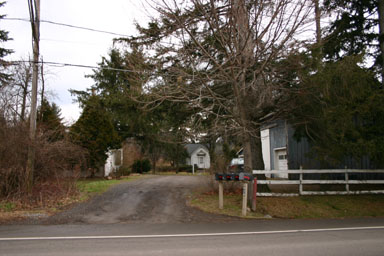
826 Dryden Road (map)
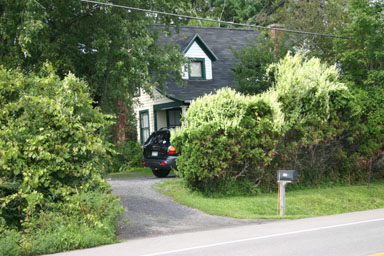
818 Dryden Road (map)
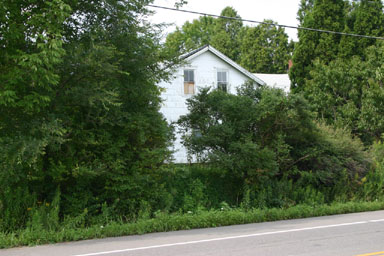
812 Dryden Road (map)
Two more sets of these, and I'll have finished 366 from the Route 13 intersection to the Town of Ithaca line. I'd better get out taking pictures of my next road of buildings!
August 12, 2004
No Dryden headlines, much Dryden news
There aren't any headlines that mention Dryden in today's Ithaca Journal, but there's lots of news relating to Dryden.
There's an article on state aid to local schools that cites Dryden Central School Board President Rachel Dickinson: "Dryden's tax rate was planned to jump 74 cents to $22.56 for 2004-05, but Dickinson said the levy cut will reduce that increase by 44 cents for a tax rate of $22.12."
A piece on the state budget notes $10.6 million coming to TC3 for its athletic facility renovation.
An article on the county's plans for a prescription discount card quotes County Legislator Martha Robertson as saying "this would especially help the uninsured, the underinsured and the working poor." The plan will not cost the county money, either. For now the plan doesn't provide access to cheaper Canadian pharmacies.
A rabid racoon was shot on North Wood Road, and the county health department will be having a free rabies vaccination program in September and October.
The SPCA is trying to capture a skittish dog running through Dryden and Lansing, and asks residents to call only if they've actually confined it.
There's also a notice about the county's Natural Resources Inventory, mentioning the interactive mapping system the county has made available. (Also, despite the warnings, it does seem to work fine with my Mozilla browser.) At the main interface of the interactive system, you can zoom into particular areas of the county and see maps including things like streams, roads, elevations, tax parcels, wetlands, and unique natural areas. I'll do a follow-up article on this sometime, as it's worth a lot of attention.
Dryden resident John Cooper, Jr., is quoted in an article on the Race Day held in Ithaca yesterday, and there's also a picture of Amy Scott and her race car.
On the opinion page, Irene Scott of Dryden (who wrote last month about convention coverage) responds to a Journal editorial by proposing drug tax stamps as another way for the county to make money.
The Purple Valley plays in Dryden
The Purple Valley played its blues, rock, swing and rockabilly last night at Montgomery Park as part of the Town's "Music in the Park" concert series.
The next (and last) concert in the Music in the Park series will be Sunny Weather, playing roots rock, zydeco, and reggae on Wednesday, August 18th, at 6pm in Montgomery Park.
Accused restaurant robber skips bail
This week's Dryden Courier has a lot of detail on Mao Shen Lin, who failed to show up to his trial for kidnapping and attempted grand larceny last week after posting $200,000 bail. Mao Shen Lin was arrested in connection with an attempted robbery at the Song Tao restaurant in the Village of Dryden last November.
In brighter news, the Courier reports on Ann Leonard's plans for a party on August 21st, which will bring together various people who enjoy Hammond Hill, including "bikers, birders, skiers, and orienteering folks," with horseback riders mentioned later in the article. The party will include live music, presentations on the nature and history of the area, and a workday for repairing Yellow Trail One. More information is available at Dryden Agway, Ludgate Farms, Eastern Mountain Sports, or online.
There's a piece introducing Dr, Mark J. Crawford, the new Dryden Superintendent, examining in particular his efforts to connect the school district and the community.
The Courier also reports on Congressman Boehlert's visit to the Freeville Fire Station, including questions from Dryden resident Joyce Kantor about Boehlert's position on the PATRIOT Act and recent efforts to amend it and discussion of equipment grants for firefighters. Lots of departments in Boehlert's district have received those grants, though the Courier notes that "No fire departments from Dryden, Groton, or Lansing are on the list."
August 13, 2004
Notes from last night's Town Board meeting
The August Town Board meeting was relatively brief and not very dramatic. Only three board members (Trumbull, Stelick, and Hattery) were there. It included:
- Nancy Zahler and Liz Vance presented on the Tompkins County Recreation Partnership, discussing Dryden's participation, the distribution of participants within Dryden, and some options for changing the Partnership structure.
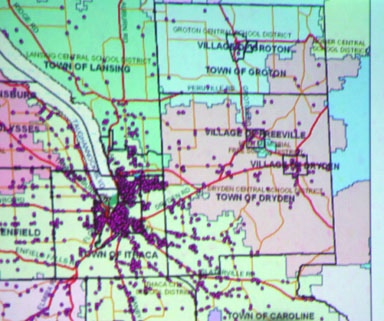
Households participating in Recreation Partnership programming.
- John Andersson of the Tompkins County Health Department discussed a preliminary report on the water problems experienced at 730 Midline Road.
- Ann Hotchkin of Thoma Associates talked with the board briefly about grant possibilities.
- Monika Roth of Cornell Cooperative Extension presented possible ways for the Town to apply for New York State Purchases of Development Rights and administer them after the purchase.
- The Highway Department is having problems because of the endless rain we've had this summer. Mowing has been very difficult, and roads and culverts are under greater pressure because of the saturated ground.
- County Legislator Mike Lane reported on the county's striving toward a budget, the complications of having to deal with both an emergency communications project and a possible jail project at the same time, and the county's own road problems with the rain.
- The Recreation Department's concerts have had less than hoped for attendance and a cancellation because of the constant rain, but people are still turning out with umbrellas. The Fishing Derby - on a rare sunny day - went very well.
- Congressman Boehlert inspected the Virgil Creek work on which FEMA is challenging the town's handling of a grant and pledged support, and Senator Schumer's office is also involved.
- The board appointed Oers Kelemen to chair the Zoning Board of Appeals as Walter Matyjas has to resign because of a promotion in NYSEG, but held off appointing a new member to the board.
- The board approved adding a streetlight to the intersection of Brooktondale Road and Route 79, and will charge costs for it to the highway budget.
Town board meeting, deficits
This morning's Ithaca Journal covers last night's town board meeting, focusing on the well contamination issues. The story also notes one part of the Highway Superintendent's report I'd forgotten: someone is stealing road signs in the northeast corner of the town, causing motorists confusion and costing the highway department money for replacements.
There's also a letter to the editor from Linda DeNoyer of Dryden, replying to an earlier letter from Chris Sampson, contending that President Bush's "fiscal policies are irresponsible" and saying that "You have the right to watch Fox, but you are completely wrong when you repeat their 'fair and balanced' mantra."
August 14, 2004
Looking forward to TC3 expansion
The state legislature has approved $10.6 million for TC3 to build a new athletic facility, though Governor Pataki's veto remains a possibility for now. The project overall will cost $23 million, with Tompkins and Cortland counties providing a local share, and the article notes that they're working to raise funds privately as well. Moving the athletic facilities will free space in the main building for additional classrooms.
The bridge on Turkey Hill Road between Ellis Hollow and Ellis Hollow Creek roads will be closed from August 16th to August 24th, with a detour over Stevenson and Game Farm roads to Ellis Hollow.
There's also a piece on the likely re-election of state legislators while support for the legislature in general is plummeting. I feel stuck much the same way. I like Assemblywoman Lifton, but can't quite believe that she goes to work in an organization so thoroughly screwed up but which still purports to be the government for the people of the State of New York. Something drastic needs to change, but it's hard to see any likelihood of that given the current rules and leadership.
Approaching the Ithaca line
I've almost reached the end of my photos of buildings along Route 366, as the 800 block is the last block in the Town of Dryden.
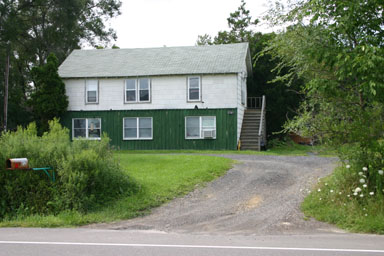
810 Dryden Road (map)
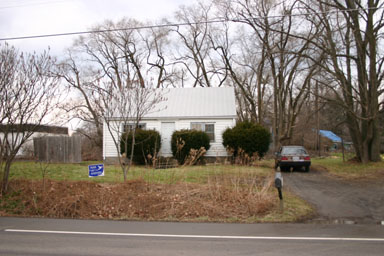
804 Dryden Road (map)
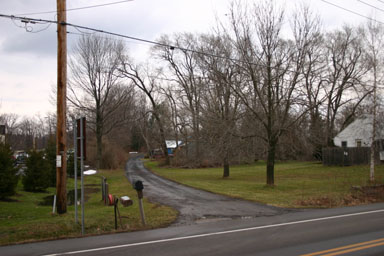
802 Dryden Road, University Cycles (map)
And yes, two of these are November pictures while one is an August picture.
August 15, 2004
Fields along Dryden Road
As I get closer to the Dryden/Ithaca boundary, one parcel really stands out. It's 45 acres of Cornell fields, actively farmed. It's large enough to build a community on it, and it's convenient to Cornell and not far from East Hill Plaza. It's large enough that it could have internal roads or even sidewalks, and be a rare pedestrian-friendly area.
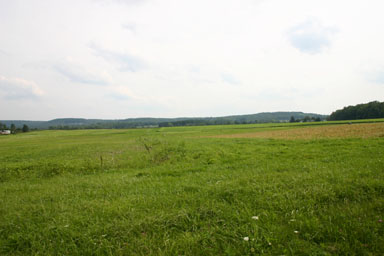
Cornell Fields along Dryden Road (map)
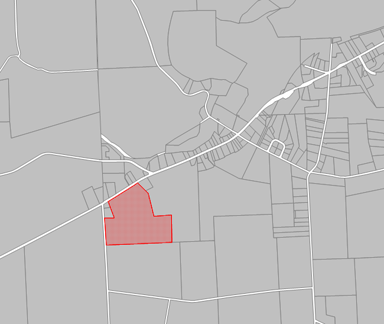
Cornell Fields along Dryden Road, parcel map
I don't expect anything to happen here soon - the Draft Comprehensive Plan shows it as agricultural, and there's no sign Cornell wants to develop this, but if there's a parcel in the town that could be under development pressure, this one's a good candidate.
August 16, 2004
"Ultimutt Makeover" pilot show filmed in Etna
This morning's Ithaca Journal reports on the shooting of a reality TV pilot show in Etna, as "UltiMutt Makeover" combines home remodeling reality show with pet care. Richard Parker and Nancy Douglas and their St. Bernard, Shasta, have left for a week while contractors modify their house to make it more comfortable for Shasta, who has hip dysplasia.
On the opinion page, the Journal's editorial and a guest column by County Administrator Steven Whicher both look at the county budget and especially the impact of postponing work on the county jail.
Freeville resident Charlie Hart writes in about the Brown Road/Route 13 intersection, saying that "to reduce the speed in that area and not install a traffic light would only create more speeders and wouldn't really cut down on accidents."
August 17, 2004
Community yard sale in Varna, upstate taxes
This morning's Ithaca Journal notes a community yard sale that will be held in Varna on Saturday, August 21st. There will be tables at the Varna Community Center (map) and maps for other local yard sales will be available.
There's also an article on Upstate New York paying higher taxes than Ohio. I have two big questions about the article. First, it seems like a press release for the Business Council of New York, one in a long series. The Business Council's perspective seems to be simple: they don't ever want to pay more taxes. (Their actual press release is here, and the report is here.) Second, the responses aren't particularly clear. I'm not sure what to make of the discussions about balancing local and state spending, and they make even less sense when combined with the original press release.
It does highlight that there is an awful lot to do in reforming New York State government to make these conversations more meaningful, but it seems like that will require more than just looking for tax cuts. Reading the report, they say that "the key to closing the tax gap Upstate is to downsize local government," but also note that the "the burden of the state’s personal income tax is worse Downstate than Upstate" and that New York's pattern of mandating local spending shifts costs away from the income tax and to upstate. The Business Council, of course, doesn't seem excited about raising income taxes, and points to the costs of New York City to drive a regional wedge in that idea. The only answer they like is cutting upstate government, not changing how it's paid for. I wonder what income tax bracket the Business Council's leadership and analysts are in.
In the lemons to lemonade category, the Journal notes at the end of its editorial that the never-ending rain we've had this summer will produce an excellent crop of apples.
Thursday's Planning Board meeting cancelled
Dryden Environmental Planner Debbie Gross wrote me today with news that the August meeting of the Town of Dryden Planning Board has been cancelled.
August 18, 2004
Willowbrook anniversary, road repair difficulties
It's Wednesday, so the Ithaca Journal's Our Towns section is focusing on Dryden and Groton. This week, there's lots of Dryden news.
They lead the Our Towns section with an article on the 25th anniversary of Willowbrook, the senior-citizens' complex in the Village of Dryden. It's run by the nonprofit Dryden Senior Housing Corporation, and isn't a medical facility, though it was built with senior citizens' needs in mind.
Also in Our Towns, Cathy Wakeman writes of visiting Washington, DC and returning to Dryden. She also notes tonight's concert in Montgomery Park - Sunny Weather, at 6pm.
There's an article on the impact of all this rain on Dryden road work. As Jack Bush said at last week's Town Board meeting, the soggy ground is damaging roads. The Highway Department still hopes to have road repairs completed by September, but a lot depends on the weather.
In Dryden Briefs there's a notice that this week's Planning Board meeting is cancelled and a reminder of Saturday's community rummage sale in Varna. There is also a list of 4-H Rabbit and Dairy Contest awards.
The print edition has a table showing percentatage of households at given income levels in the Village of Dryden. The data is similar to this census data though slightly more combined.
In Etna, the Journal describes the results of the "Ultimutt Makeover" work done over the last few weeks to make a house more dog-friendly.
In county news, the budget hasn't been changed by the state budget, and it looks like the TCAT bus system will become a not-for-profit corporation.
Purchasing farm development rights
This week's Dryden Courier has fairly little about Dryden in it. Even one of the front page articles takes place over in Mecklenburg. On the bright side, the lead article on Dryden has a lot of detail on an important happening.
Monika Roth of Cornell Cooperative Extension gave an initial presentation at last week's Town Board meeting on the possibility of the town applying to the state to buy development rights from farms here. Those rights would be held by the town, or by a third party like Finger Lakes Land Trust, and the farmers would get cash up front - 75% of the potential development value of their properties. Tony Hall takes a close look at what the program means on a number of levels, with lots of detail on the farms and farmers involved.
There are also a number of letters supporting Congressman Boehlert, though none of them are from Dryden, and a notice about tonight's concert by Sunny Weather frontman Trevor MacDonald.
August 19, 2004
Body found on eastern edge of Dryden
Yesterday's Cortland Standard reported that searchers found the body of a man, an apparent suicide, 100 yards into the Town of Dryden after searches in Cortland County had found nothing. Route 13 was closed yesterday morning at Old Dryden Road as part of the investigation. The man, Robert Levy, had grown up on Sweetland Road, where his brother still lives.
Volunteers needed, budget, TCAT
The most Dryden-specific news in this morning's Ithaca Journal is a notice calling for volunteers to help Project CARE, a volunteer program of the Tompkins County Office for the Aging. There are two opportunities to help people in Freeville and one near NYSEG.
At the county level, the Journal has an article on the many capital projects competing for space in the county budget. Emergency communications, roads, a possible new jail, and county offices are all on the list, though not all of them will be happening any time soon.
The Ithaca City School District and its staff are in contract negotiations, hoping to replace a contract that expired June 30th with a new one by September 1st.
The Journal's editorial makes clear that the concentration of leadership in New York's legislative leaders has local consequences:
Assemblywoman Barbara Lifton, D-125th Dist., said she was informed by the speaker's senior staff that, "this bill would not go through the Assembly as written." Lifton said that she tried to make the case for the TCAT legislation but eventually concluded that introducing the bill under those circumstances would have been "an empty political gesture."
The Speaker apparently opposed the bill because it would have resulted in the likely merger of a CSEA local with a larger UAW local.
Sunny Weather stays dry
The last concert of the Dryden Summer Family Concerts escaped the rain, as Sunny Weather (or at least its frontman, according to the Dryden Courier) performed at Montgomery Park yesterday.
August 20, 2004
Dryden teachers, district reach agreement
This morning's Ithaca Journal reports that the Dryden Central School District and Dryden Faculty Association have reached a tentative four-year agreement. (Because of the delay in reaching a contract, it covers from July 2002 to June 2006.) Teachers will vote on the proposed contract September 2nd, and it sounds like there's more optimism this contract will pass than the last:
Mary Ellen Bossack, president of the DFA, said "the association would be surprised" if the newest agreement wasn't approved...."There's a real sense of being valued," Bossack said. "It's not as though the issues just disappeared. We worked very hard to get to this point."
The Ithaca School District is examining athletic eligibility rules, and the Journal's editorial looks at the airport's future.
Reaching the Ithaca line
My photographic trek from Route 13 to the Town of Ithaca line along Route 366 has come to its end. After the last few houses and the fields, only two buildings remain, both on the border between the Town of Dryden and the Town of Ithaca.
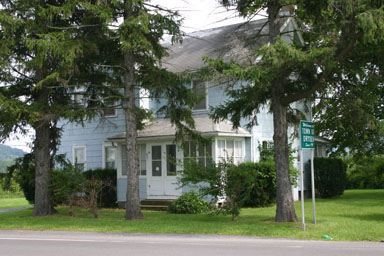
801 Dryden Road (map)
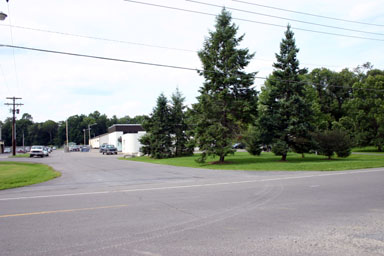
800 Dryden Road, Cornell Statutory Fleet Garage (map)
I'll continue next week with the Route 13/366 overlap area. I haven't decided what I'll do after that.
August 21, 2004
Pataki vetoes TC3 expansion funding
Governor Pataki's budget vetoes struck TC3 and Cornell yesterday, as the governor vetoed all capital funds for higher education, including $10.6 million for TC3's expansion and $12 million for Cornell renovations. A legislative override seem uncertain, though there's definitely some anger in Albany. I suspect the Senate will wait until after the Republican National Convention to do anything in any case.
Bolton Point water rates are likely to increase (my own included), as the water utility faces increasing costs for construction. There will be a public hearing on this at the September Town Board meeting.
Absentee ballots are available for the September 14th Republican primary election, where voters will choose between incumbent Sherwood Boehlert and challenger David Walrath in the 24th Congressional District, which includes Dryden.
There's a list of dairy show winners dated July 30th that I think is from the recent 4-H Fair on Lower Creek Road, though it doesn't say that clearly.
There are both a Laurel and a Dart from Dryden this week. Patricia Ober gives the Hangar Theatre a Laurel for their production of "Cats," while Henry Kramer gives a Dart to the young man who tore down his Bush-Cheney sign, apparently the fifth time it's been removed.
Ithaca Journal Managing Editor (and Dryden resident) Bruce Estes writes about the challenges of buying women's slacks and discrimination against a former photographer, concluding that "Parking is hard enough to find on East Hill without having to worry where your ancestors were born."
Events today
If you're looking for something to do today, I know of at least two events worth visiting:
- Varna is having a collection of yard sales from 9am to 3pm. I helped set up last night at the Varna Community Center, where a highlight is Art Berkey's lovely refurbished hand tools, and there will be other sales throughout the hamlet. I saw a sign for a sale at Varna United Methodist Church, too.
- The Hammond Hill Block Party will be running from 8am to 5pm today, including trail repair, music, orienteering, mist netting, a forest walk, horses, and Hammond Hill history. More details are available online.
Update, 10:15am: Despite the rain, the rummage sale and the Chicken BBQ at the Methodist Church are underway. I've posted the map (96KB PDF), and here are some pictures:
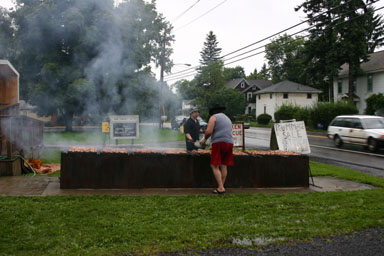
Chicken BBQ, Varna United Methodist Church
Hammond Hill block party
Wow. Ann Leonard knows how to throw a great party. Start with a few hours of shoveling mud in the rain, then head back to a camp area where barbecued chicken is waiting, people are playing music (including bagpipes), orienteering and history information is available, ornithologists are trying to capture birds, runners are getting ready, and riders on horseback come down the road. Put it at the end of the road, in a beautiful area surrounded by state forest.
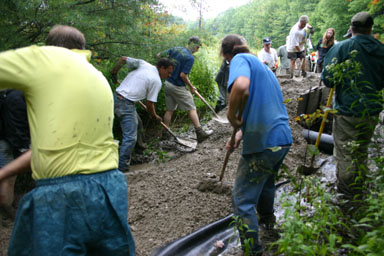
Repairing a trail on Hammond Hill.
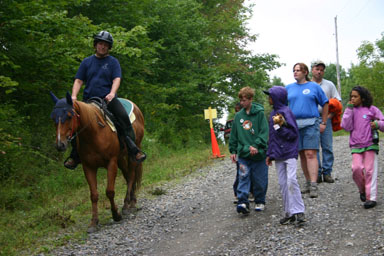
A horse on the seasonal use portion of Hammond Hill Road.
I arrived too late to shovel much gravel, and it's kind of tricky with a camera, but it was amazing to see a group of people come together to repair a trail like that. I liked seeing the Dryden Historical Society bring a display to the camp, kind of a "history where it happened", and the people from the Lab of Ornithology with the mist nets were very impressive, despite the birds choosing to stay away.
I've put up a full gallery of all my pictures for the day, including some blurry ones.
August 22, 2004
George Goodrich's father
George Goodrich unsurprisingly has kind things to say about his father in the biography he provides in the Centennial History of Dryden, portraying a brilliant man who overcame financial difficulties to become a great lawyer.
Chapter XLVIII.
Milo Goodrich.
The subject of this chapter was born at East Homer, N. Y., January 3, 1814. His parents, who had recently emigrated from the East, were natives of Sharon, Conn., and were in humble but respectable circumstances, his mother, Almira (Swift,) being a woman of great industry and ambition, while his father, Philander, was a mason by trade, serving at one time as captain of the state militia, and noted as a man of high character and genial disposition. When Milo was about two years of age, his parents moved and located upon a small farm near the Marl Ponds in Cortlandville, where the childhood of our subject was spent. He early manifested a great fondness for books, and when he was sixteen years of age he commenced teaching the same district school at South Cortland where, up to that time, he had received his education. Thereafter he pursued his studies by means of the money which he could save in teaching, being a student of the old Cortland Academy at Homer, and afterwards at Oberlin Instititue, in Ohio, which had then been recently established to aid students who were obliged to pay their own way. In the meantime he taught at district schools in Groton, Peruville, and Berkshire, N.Y., as well as in Mahoning, Pa., and Brooklyn and Weymouth, Ohio. In the year 1838 he commenced the study of law in the office of Judge Barton, at Worcester, Mass., where he was admitted to practice in 1840. He then went West, to the territory, as it was then, of Wisconsin, where he practiced law in the new country at Beloit. After two years of this experience he returned to New York, and in 1844 he married Eunice A. Eastman, of the town of Groton, and soon afterwards removed to the adjoining town of Dryden, which was his home for the next thirty years.
Here he commenced his practice of law in a very humble way, renting only rooms in which to commence housekeeping, possessing not means, and not yet admitted to practice in the higher courts of this state. There was, however, in those days, much litigation in justice's court, which served as a school in which his great natural ability rapidly developed, and he was thus enabled to raise from the lowest to the highest grade of profession. In 1849 he was appointed postmaster at Dryden village and at about the same time he served as superintendent of schools for the township.
In 1848 his parents moved to Dryden, building with him the home on South street where they lived together until their death.
In 1867 Mr. Goodrich was elected a delegate to the state constitutional convention of that year, and subsequently was a member of Congress from his district. In the former capacity, as a member of the judiciary committee and among men of the highest rank in the state, he alone submitted a minority report in favor of an elective judiciary with a term of fourteen years for its judges, instead of changing back to a judiciary appointed for life; and his report, substantially as submitted by him and subsequently adopted by the convention and finally by the people of the state, embraces the system which has ever since prevailed.
In the year 1875 his increasing practice in the U.S. courts and the higher courts of his own state influenced him to remove to Auburn, where he continued to be engaged in a business of great activity and success until about two weeks before his death, which occurred April 15, 1881. His remains were brought to Dryden, where they rest with those of his parents and of several of his children, who had died before him. During the past year, his wife, Eunice A. Goodrich, who was a woman of domestic habits but possessed of a strong character, and was a devoted wife and a noble mother of his children, was buried beside him.
Of their eight children three only survive, viz: George E., who occupies the homestead and continues the practice of law in Dryden; Frank, who is now a member of the faculty of Williams College; and Fanny G. Schweinfurth, of San Francisco, Cal.
It will be impossible to convey to the reader who did not know him an adequate conception of the magnetic power of Milo Goodrich as a speaker, especially when engaged in the trial of cases before a jury. When he was attending court in Ithacac and Cortland there were but few important trials in which he was not engaged. He devoted himself almost exclusively to his chosen profession, which he pursued for the success which awaited his efforts in it, rather than for the pecuniary compensation. Many of the expressions in his arguments were so impressive that they are still remembered and cherished by those who listened to them. He was endowed by nature with a strong physical constitution, which rendered him capable of incessant work, and he possessed great mental power, which, when fully developed, impressed all who came in contact with him. Not alone distinguished as a lawyer, he developed rare literary taste and culture, and some of his poetry upon local subjects exhibited his abilities in that direction. Upon public occasions he frequently delivered addresses, and in all political campaigns of his time he was one of the foremost speakers.
He was a Republican in politics until the Greeley campaign, which caused him to separate himself from the party to which he had, up to that time, given his earnest and conscientious support. Of a generous and public-spirited disposition, he liberally supported all public enterprises, and, when the Southern Central railroad was contemplated, he united his efforts with others in securing its accomplishment, without seeking its emoluments. His magnetic influence as a speaker and his high character as a man will always be rememberd by those who personally knew him, but he cannot fully be appreciated and understood from any description which can be given.
Goodrich, George B. The Centennial History of the Town of Dryden, 1797-1897. Dryden: Dryden Herald Steam Printing House, 1898. Reprinted 1993 by the Dryden Historical Society. Pages 212-214.
(The Dryden Historical Society, which sells this book, may be reached at 607-844-9209.)
Preliminary county report on water contamination
I mentioned earlier that John Andersson of the Tompkins County Health Department talked at the Town Board meeting about the water contamination problem at 730 Midline Road. It was yet another frustrating exchange, as the county's hands seem tied by the lack of a clear owner for the house seen as the most likely cause of contamination, 483 Hunt Hill Road.
Andersson mailed me a copy of the report, and I have it up as PDF (448KB blurry with selectable text, or 508KB clearer without selectable text). There's a lot in there, but it sounds overall like there can't be much definitive until the county can get into the property and run tests with the septic system actually in use.
August 23, 2004
Walrath fails to find cash
It seems to have been a quiet weekend in Dryden from the Ithaca Journal's perspective, but there's a piece looking at the primary in the 24th Congressional District, where the Club For Growth, which supported him verbally, hasn't come through with cash, citing "limited resources."
There's also a thank-you to science groups in Varna, Freeville, and Dryden.
On the editorial page, Gannett columnist Jay Gallagher has a sour question-and-answer about the state of New York State politics that seems sadly accurate.
August 24, 2004
Crawford starts well; Gingrich to speak for Boehlert
This morning's Ithaca Journal reports that new Dryden superintendent Mark Crawford "has made a positive impression in a short time." Crawford made progress quickly in reaching a contract agreement with the Dryden Faculty Association that will be voted on September 2nd, and has a strong emphasis on keeping morale up.
In the Republican Congressional Primary, former House Speaker Newt Gingrich will be speaking at an Auburn fund-raiser for Congressman Sherwood Boehlert in Auburn on September 10th, four days before the primary.
On the opinion page, Ron Flynn, Chief of the Neptune Hose Company, writes to wish the best of luck to Dale Oplinger, who is leaving the chief's position in Lansing for a chief's position in North Carolina.
The Journal's own editorial explores options for the Rec Partnership in the wake of reduced county funding.
August 25, 2004
$5,000 for Dryden Youth Opportunity Fund
The Ithaca Journal's Our Towns section has added Caroline to its Wednesday edition, making it "Caroline & Dryden & Groton." There's still plenty of Dryden news this week.
The Dryden Youth Opportunity Fund has received a $5,000 award from the Helen Thomas Howland Foundation. In the same briefs, there are also a mention of the Etna Community Church's 200th anniversary celebration, planned for September 19th, and a notice of a tire collection to be held at the Town of Dryden Highway Barn from 8am to 1:30pm on October 16th.
The Neighbors section (which doesn't appear to be online) notes that Navy Petty Officer 2nd Class Aaron D. Abb, originally of Freeville, has returned home from deployment to the Persian Gulf, and that David A. Drew of Dryden High School has won a Rensselaer Medal, bringing with it a scholarship to RPI.
The demographic table this time lists the number of vehicles per household in Freeville, a table I can't find on the census pages. About 7% of residents have no vehicles, while 38% have one, 43% have two, and no one has five or more.
In county news, there's budget discussion, especially around capital projects, as well as a forum to discuss county issues, notably the prospect of a new jail and the county executive. The forum will be held August 31st from 7-9pm in the Borg-Warner room of the Tompkins County Public Library (map).
Teachers' agreement, water issue
This week's Dryden Courier explores the happier feelings coming out of the Dryden Central School District's negotiations with the Dryden Faculty Association. If all goes well as seems possible in the September 2nd vote, teachers should have a contract in place before the school year starts.
The other front page article looks at the water contamination problem at 730 Midline Road, examining both the water issues and the property-ownership questions that have made resolving the water issues so difficult.
There's a picture on the front page of Ted Sobel playing washtub bass at the recent Hammond Hill Block Party. Previously I'd seen Ted (minus the washtub) at Babbage's Basement, a place I strongly recommend to anyone who'd like to be a recycled computer cheaply, or who wants to donate used computer equipment to a worthy cause. (It's a project of the Sciencenter.)
The Sports pages look at boys and girls soccer, and include schedules for both teams as well as pictures.
On the editorial page, the Courier joins the Ithaca Journal in its recent concerns over Assemblywoman Barbara Lifton's decision not to even present a bill for making TCAT an authority, leaving it stuck in the less convenient category of non-profit organization. Their last paragraph sums up the problem well:
"When Lifton was running for State Assembly, the Ithaca Times pressed to see if she would challenge the Democratic Assembly leadership, which has been anathema to good governance in New York State. However, Lifton glided past our question, declining to even agree that Albany is dysfunctional. We can only hope that, after less than two years, she has not already been lost in the rusty cogs of the Albany machine."
(The full editorial is available on the Ithaca Times web site.)
August 26, 2004
Artists' haven; college veto frustrations
The Constance Saltonstall Foundation for the Arts, on Ellis Hollow Road, gets an Ithaca Journal article about its Artist Colony program today. Five artists at a time spend a month at the colony working on projects.
There's more discussion of the impact of Governor Pataki's vetoes on capital spending at TC3 and Cornell, and TC3 also faces $325,000 less operating money than expected.
While the state is cutting college funding, it's reaching down to the town level to collect more funds for itself, claiming $22.8 million in traffic fine money. This was originally in Governor Pataki's original budget and survived the negotiations.
Ron Flynn, Chief of the Neptune Hose Company, praises Dale Oplinger in an article about the departing Lansing Fire Chief.
On the opinion page, Charlie Hart of Freeville tries his hand at a satire of Kerry supporters. (Hart's letter is in the middle of three on that page.)
Wilcox Press
After reaching the Ithaca line on 366 heading west, I decided to cover the Route 13/366 overlap area next. First up: a large employer, Wilcox Press.

Wilcox Press (map)
I've heard a few times that taxpayers in the Dryden Central School District were disappointed to find that this particular parcel is in the Ithaca City School District.
August 27, 2004
More youth in need of supervision
Judging by the Journal's local news page, yesterday was one of the quietest local news days in a long time. I guess it's August!
County Legislator Martha Robertson is cited extensively in a story about the rise in Persons In Need of Supervision (PINS) from 149 in 2001 to 188 in 2003. Supervision is expensive: $193,000 last year for 429 days of detention. (That's around $450 a day.) Robertson would prefer to see earlier intervention and work with families: "There is unanimous agreement that earlier we work with families in trouble, the more successful we will be."
The Journal's editorial looks at the costs of Pataki's vetoes of $10.6 million of capital project aid and $325,000 of base aid. It's up to the legislature, especially the Senate, which controls the timing, to attempt an override or let it stand. As the Journal puts it, "Despite the inexcusably late budget, state legislators have an opportunity to recoup whatever lingering public respect remains for them by restoring the capital improvement lines and base aid for the SUNY system."
August 28, 2004
Non-profit option for Rec Partnership
It doesn't sound like anything happened in Dryden yesterday, but the Journal reports on another option for the Rec Partnership: forming a non-profit. There's no mention of Dryden's position on this option, but the Caroline, Newfield, and Ulysses town boards have voted in favor of it.
August 29, 2004
Sometimes I miss things
Last night, I was down on the Ithaca Commons with my wife and a friend from Dryden waiting for other friends from Dryden to arrive. I looked at the kiosk at the bottom of the time/temperature sign, and there was a sign about the Eight Square Schoolhouse. Unfortunately, the events they were advertising happened Friday and Saturday.
It's advertised on the History Center site, and they seem to have sent me an email about it in June, but I guess I didn't get the message. If anyone has pictures or news of the events, I'd love to hear about it.
August Town Board minutes available
The minutes for the August Town Board meeting (which was pleasantly briefer than most have been) are now available on the Town's web site.
August 30, 2004
Dryden Veterans Memorial Home robbed
This morning's Ithaca Journal reports that the Dryden Veterans Memorial Home was robbed last weekend. Thieves broke into a video lottery machine and an empty safe, and cut phone lines.
Farm disaster aid is available for farmers whose crops were damaged by high winds and rain last month. Applications are available at the Farm Service Agency offices in Tompkins and Cortland counties.
On the opinion page, Peter Harriott of Dryden writes about emissions and how to control them. The editorial blasts New York State for grabbing $22.8 million in fines from town governments. There's also a guest column by Stacey Crawford of Better Housing for Tompkins County, celebrating their 200th closing on a house and their default rate of under 2%.
Where do you participate?
It's been a while since I posted a question. Good ones are hard to come up with, especially if I want to keep them brief.
I've been thinking about the many organizations in Dryden. Some are formally incorporated, others are part of government, schools, or churches, and some are just people who know each other in neighborhoods, or temporary gatherings of people for a specific purpose. Finding time to participate in all of them seems impossible, but many people go to the other extreme and participate in as few as possible. (I participated in very few my first three years here.)
Very few institutions cover the Town of Dryden as a whole, with the exception of town government, the political parties, and the Dryden Town Historical Society. The Dryden and Ithaca school districts both claim large parts of Dryden but extend well beyond the town boundaries. Other districts cut into Dryden as well, and some students go to church-affiliated schools. Dryden is served by six different volunteer fire companies, two of which are based slightly outside of the town. Even when there is a "Dryden" organization, some people participate in Ithaca, Lansing, Cortland, or Groton organizations instead.
The Methodist churches in Dryden serve particular localities - there are enough of them to cover different parts of town. Other denominations have one church in Dryden, or members attend churches elsewhere in the area.
The western side of Dryden has community centers - Bethel Grove, Ellis Hollow, Varna, and Etna. Further east more activity seems centered on the villages, which have their own governments and institutions like the Southworth Library.
Think about where you participate, and who you see there. Is it mostly the same people? Different people? Do you ever act as a bridge between those groups? All of these connections form the web that supports a sense of community.
One of those wet days
It just won't stop raining lately, and it's been raining hard. Here are some pictures from my yard.
I've seen worse, of course.
August 31, 2004
Rain damage, forum tonight
Yesterday's heavy rains are a big story in the Ithaca Journal today, with a piece on a rollover on Hanshaw Road caused by flooding, an article on flooding in Groton and throughout the county, and an article that looks at the rain's impact across the state.
The Tompkins County Legislature will be holding a public forum tonight at 7pm to discuss the jail construction and county executive proposals. The forum will be in the Borg-Warner room of the Tompkins County Public Library (map).
An article about a new low-income housing complex in Trumansburg cites a former Dryden resident saving $267 a month in rent by moving there.
Congressman Sherwood Boehlert is cited in an article on the influence of moderates in the Republican party, saying that "We work exceptionally well with the majority despite the fact that we have some differences."
On the opinion page, Anita Richards of Freeville, unhappy about an August 23rd protest on the Ithaca Commons, claims that "People have long believed that good fences make good neighbors" and that "the Palestinians' true goal is not peaceful coexistence with Israel, but the utter destruction of the Jewish state."
Peaceful public forum
After all the excitement earlier this year over a county executive proposal, I figured someone might show up at a public forum to speak in support of the idea. Similarly, given the questions of the cost of the state's expectations for jail expansion, someone might come who actually wants a larger jail.
It was not to be. County Legislator Mike Lane opened with a report on the legislature's research into the county executive position. New York has a wide variety of county structures, and the Government Operations Committee has been visiting other counties for information on their experience. County executive structures come with costs - executives are typically paid more than administrators, and have deputies who are paid about as much as administrators.
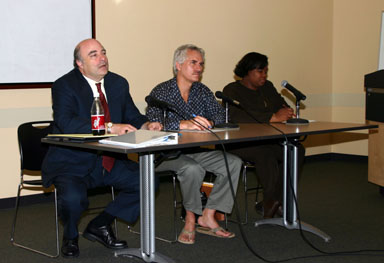
Mike Lane presenting on county executive possibilities, with Tim Joseph and Leslyn McBean-Clairborne.
County Legislator Leslyn McBean-Clairborne presented on the county's efforts to sort out the size of a new county jail, with options ranging from renovating the current jail to expanding it from 72 to 160 beds.
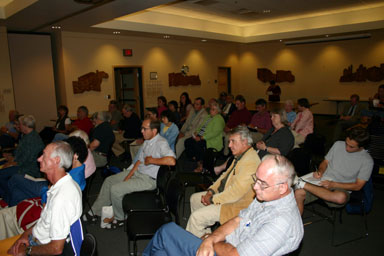
Audience at the forum on county issues.
Much to my surprise, no one at all spoke in favor of changing to a county executive form of government or in support of expanding the jail.
The range of opinions on the county executive ranged from Caroline Town Supervisor Dan Barber and Ithaca Town Supervisor Catherine Valentino's support for examining county government to Ray Schlather's conclusion that the research itself was a waste of time. County Legislator Frank Proto clarified that while the county executive proposal had come from County Republican Chairman Mark Finkelstein, it was not a proposal from the Republican party as a whole.
On the jail, the costs of expansion, the state's apparent insistence on a larger jail, and the prospects for rehabilitation programs were recurring themes in the opposition to the expansion, but there was no support for expansion, especially to the size of expansion the state has wanted. (The state asked for 160 beds, now 136 plus 8 seems to be something they'll consider.)



